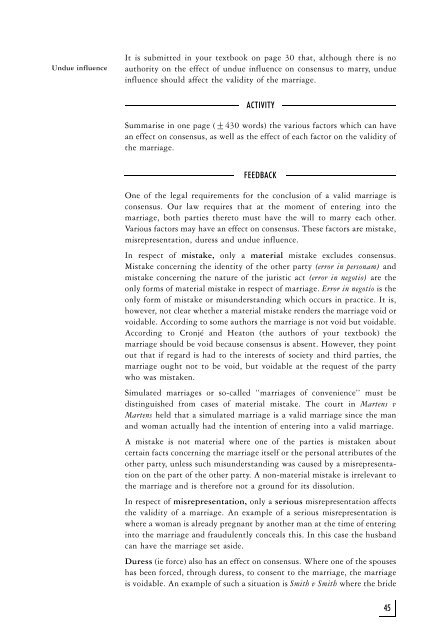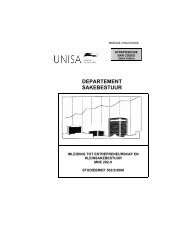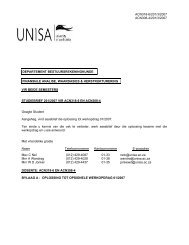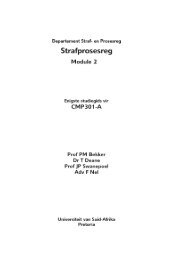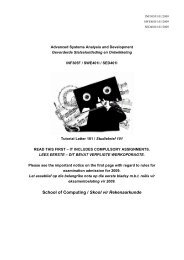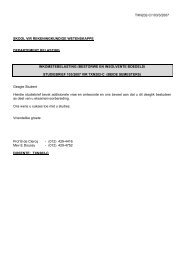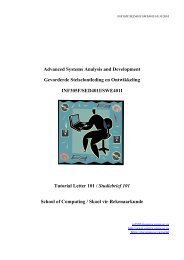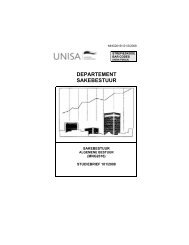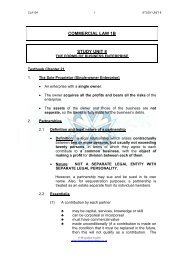key to the study guide - Name
key to the study guide - Name
key to the study guide - Name
Create successful ePaper yourself
Turn your PDF publications into a flip-book with our unique Google optimized e-Paper software.
Undue influence<br />
It is submitted in your textbook on page 30 that, although <strong>the</strong>re is no<br />
authority on <strong>the</strong> effect of undue influence on consensus <strong>to</strong> marry, undue<br />
influence should affect <strong>the</strong> validity of <strong>the</strong> marriage.<br />
ACTIVITY<br />
Summarise in one page (+430 words) <strong>the</strong> various fac<strong>to</strong>rs which can have<br />
an effect on consensus, as well as <strong>the</strong> effect of each fac<strong>to</strong>r on <strong>the</strong> validity of<br />
<strong>the</strong> marriage.<br />
FEEDBACK<br />
One of <strong>the</strong> legal requirements for <strong>the</strong> conclusion of a valid marriage is<br />
consensus. Our law requires that at <strong>the</strong> moment of entering in<strong>to</strong> <strong>the</strong><br />
marriage, both parties <strong>the</strong>re<strong>to</strong> must have <strong>the</strong> will <strong>to</strong> marry each o<strong>the</strong>r.<br />
Various fac<strong>to</strong>rs may have an effect on consensus. These fac<strong>to</strong>rs are mistake,<br />
misrepresentation, duress and undue influence.<br />
In respect of mistake, only a material mistake excludes consensus.<br />
Mistake concerning <strong>the</strong> identity of <strong>the</strong> o<strong>the</strong>r party (error in personam) and<br />
mistake concerning <strong>the</strong> nature of <strong>the</strong> juristic act (error in negotio) are <strong>the</strong><br />
only forms of material mistake in respect of marriage. Error in negotio is <strong>the</strong><br />
only form of mistake or misunderstanding which occurs in practice. It is,<br />
however, not clear whe<strong>the</strong>r a material mistake renders <strong>the</strong> marriage void or<br />
voidable. According <strong>to</strong> some authors <strong>the</strong> marriage is not void but voidable.<br />
According <strong>to</strong> CronjeÂand Hea<strong>to</strong>n (<strong>the</strong> authors of your textbook) <strong>the</strong><br />
marriage should be void because consensus is absent. However, <strong>the</strong>y point<br />
out that if regard is had <strong>to</strong> <strong>the</strong> interests of society and third parties, <strong>the</strong><br />
marriage ought not <strong>to</strong> be void, but voidable at <strong>the</strong> request of <strong>the</strong> party<br />
who was mistaken.<br />
Simulated marriages or so-called ``marriages of convenience'' must be<br />
distinguished from cases of material mistake. The court in Martens v<br />
Martens held that a simulated marriage is a valid marriage since <strong>the</strong> man<br />
andwomanactuallyhad<strong>the</strong>intentionofenteringin<strong>to</strong>avalidmarriage.<br />
A mistake is not material where one of <strong>the</strong> parties is mistaken about<br />
certain facts concerning <strong>the</strong> marriage itself or <strong>the</strong> personal attributes of <strong>the</strong><br />
o<strong>the</strong>r party, unless such misunderstanding was caused by a misrepresentation<br />
on <strong>the</strong> part of <strong>the</strong> o<strong>the</strong>r party. A non-material mistake is irrelevant <strong>to</strong><br />
<strong>the</strong> marriage and is <strong>the</strong>refore not a ground for its dissolution.<br />
In respect of misrepresentation, only a serious misrepresentation affects<br />
<strong>the</strong> validity of a marriage. An example of a serious misrepresentation is<br />
where a woman is already pregnant by ano<strong>the</strong>r man at <strong>the</strong> time of entering<br />
in<strong>to</strong> <strong>the</strong> marriage and fraudulently conceals this. In this case <strong>the</strong> husband<br />
can have <strong>the</strong> marriage set aside.<br />
Duress (ie force) also has an effect on consensus. Where one of <strong>the</strong> spouses<br />
has been forced, through duress, <strong>to</strong> consent <strong>to</strong> <strong>the</strong> marriage, <strong>the</strong> marriage<br />
is voidable. An example of such a situation is Smith v Smith where <strong>the</strong> bride<br />
45


